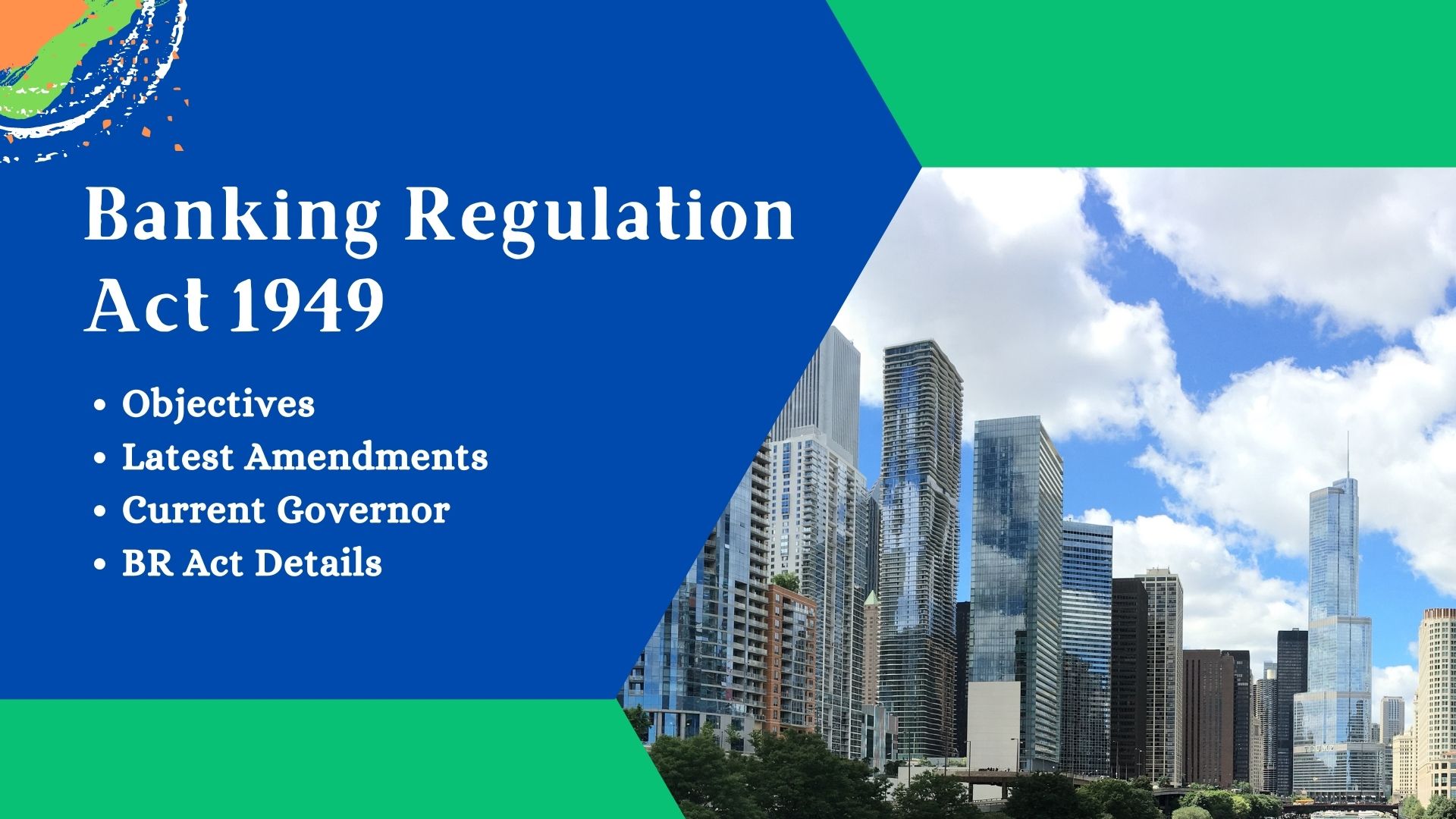The Banking Regulation Act was passed as the Banking Companies Act 1949 came into force on 16th March 1949. Subsequently, it was changed to Banking Regulations Act 1949 on 1st March 1966. Initially, the law was applicable only to banking companies. But, in 1965 it was amended to make it applicable to cooperative banks as well.
A bank is a financial institution that deals with deposits and advances and other related services. It receives money from those who want to save in the form of deposits and lends money to those who need it. According to Banking Regulation Act 1949: “Banking is defined as accepting, for the purpose of lending or investment, of deposits of money from the public repayable on demand or otherwise and withdrawable by cheques, drafts, order or otherwise.” Though Banks perform several other functions of maintaining the financial stability of the economy.
The evolution of banks took place several centuries ago. It is said to have its origin in Mesopotamia where Royal palaces & temples served as secure places for storing grains & other commodities which were regulated through the code of “Hammurabi”. After all, the whole purpose of banking was to safeguard valuables.
Banking Regulation Act 1949 was passed to strengthen Indian Banking Sector and promote economic growth. Banks required detailed guidelines to ensure smooth functioning, thus specific legislation was necessary to explicitly detail all the rules, regulations, powers, prohibitions which could be followed religiously. This would minimize the failure of banks and would also ensure strict adherence to the guidelines.
Table of Contents
Who is the Current Governor of RBI?
Currently, the Governor of the Reserve Bank of India is Shaktikanta Das. He was appointed in the year 2018, December 12 replacing Urjit Ravindra Patel. Retired IAS officer Shaktikanta Das is the first non-economist RBI Governor since 1990 when S Venkitaraman was appointed to the post. The government of India appoints the RBI Governors. Normally the tenure of RBI governor is 3 years.

Objectives of Banking Regulation Act 1949 are:
- Provide elaborate legislation containing comprehensive provisions, specific to the banking business in India
- To regulate banking operations in India & maintain financial stability
- Prevent bank failures while providing sufficient liquidity and maintaining minimum capital requirements
- Safeguard the interests of depositors by maintaining sufficient reserves
- Strengthen the banking system of the country
- Prohibit certain actions which may collapse the essence of a sound banking system
- Empower RBI to make rules and regulations for banks to control, inspect and regulate the banking system.
Setting the framework of the Banking Regulation Act 1949 helped to discipline the banking behavior across and start the process of financial inclusion. It was immensely useful in boosting financial growth & stability.
As per the Banking Regulation Act, 1949 below are the defined terms with respective sections
- Banking means accepting for the purpose of lending or investment of deposits of money from public repayable on demand or otherwise and withdrawable by cheques, drafts order or otherwise (5 (i) (b))
- A banking company means any company which transacts the business of banking (5(i)(c)
- Transact banking business in India (5 (i) (e)
- Demand liabilities are the liabilities that must be met on demand and time liabilities means liabilities that do not demand liabilities (5(i)(f)
- Secured loan or advances means a loan or advance made on the security of asset the market value of which is not at any time less than the amount of such loan or advances and unsecured loan or advances means a loan or advance not secured (5(i)(h)
- Defines business a banking company may be engaged in like borrowing, lockers, letter of credit, traveler cheques, mortgages, etc (6(1)
- States that no company shall engage in any form of business other than those referred in Section 6(1) (6(2)
- For banking companies carrying on banking business in India to use at least one-word bank, banking, banking company in its name (7)
Restrictions or Prohibitions mentioned in the Banking Regulation Act 1949
- Restrictions on the business of certain kinds such as trading of goods etc. (8)
- Prohibits banks from holding any immovable property howsoever acquired except as acquired for its own use for a period exceeding 7 years from the acquisition of the property. RBI may extend this period by five years (9)
- Prohibitions on employments like Chairman, Directors, etc (10)
- Paid-up capital, reserves, and rules relating to these (11 & 12)
- Banks not to pay any commission, brokerage, discount, etc. more than 2.5% of the paid-up value of one share (13)
- Prohibits a banking company from creating a charge upon any unpaid capital of the company. (14)
- Section 14(A) prohibits a banking company from creating a floating charge on the undertaking or any property of the company without the RBI’s permission
- Prohibits payment of dividend by any bank until all of its capitalized expenses have been completely written off (15)
- Restrictions on banks to grant loans to the person interested in the management of the bank (20)

Statutory requirements prescribed by the Banking Regulation Act 1949
- To create a reserve fund and 20% of the profits should be transferred to this fund before any dividend is declared (17 (1))
- Cash reserve – Non-scheduled banks to maintain 3% of the demand and time liabilities by way of cash reserves with itself or by way of balance in a current account with RBI (18).
- Every bank to maintain a percentage of its demand and time liabilities by way of cash, gold, unencumbered securities 25%-40% as on last Friday of 2nd preceding fortnight (24)
- Permits banks to form a subsidiary company for certain purposes (19)
- No banking company shall hold shares in any company, whether as pledgee, mortgagee, or absolute owners of any amount exceeding 30% of its own paid-up share capital + reserves or 30% of the paid-up share capital of that company whichever is less. (19(2).
- Power to Reserve Bank to issue a directive to banks to determine policy for advances (21)
- Every bank has to publish its balance sheet as of March 31st (29).
- The balance sheet is to be got audited from qualified auditors (30 (i))
- Publish balance sheet and auditors report within 3 months from the end of the period to which they refer. RBI may extend the period by a further three months (31)
- Return of unclaimed deposits (10 years and above) (26)
What is Banking Regulation Act 2020?
The Banking Regulation (Amendment) Bill, 2020 was introduced in Lok Sabha by the Minister of Finance, Mrs. Nirmala Sitharaman, on March 3, 2020. The Act regulates the functioning of banks and provides details on various aspects such as licensing, management, and operations of banks. The Amendment brought some changes as listed below:
- It brought 1,482 urban and 58 multi-state cooperative banks under the regulation & direct supervision of the RBI.
- Power to make a scheme for reconstruction or amalgamation without imposing a moratorium.
- Authority to remove the ceiling on the issuance of shares and securities by cooperative banks.
- Power to interfere with the management of cooperative banks or supersede the Board of Directors.
- Authority to exempt cooperative banks
Link to the document-banki15122014.pdf (rbi.org.in)
FunFact
Currently, there are 12 Public Sector Banks & 22 Private Sector Commercial Banks in India
Let us know your thoughts on the Banking Regulation Act of 1949?


